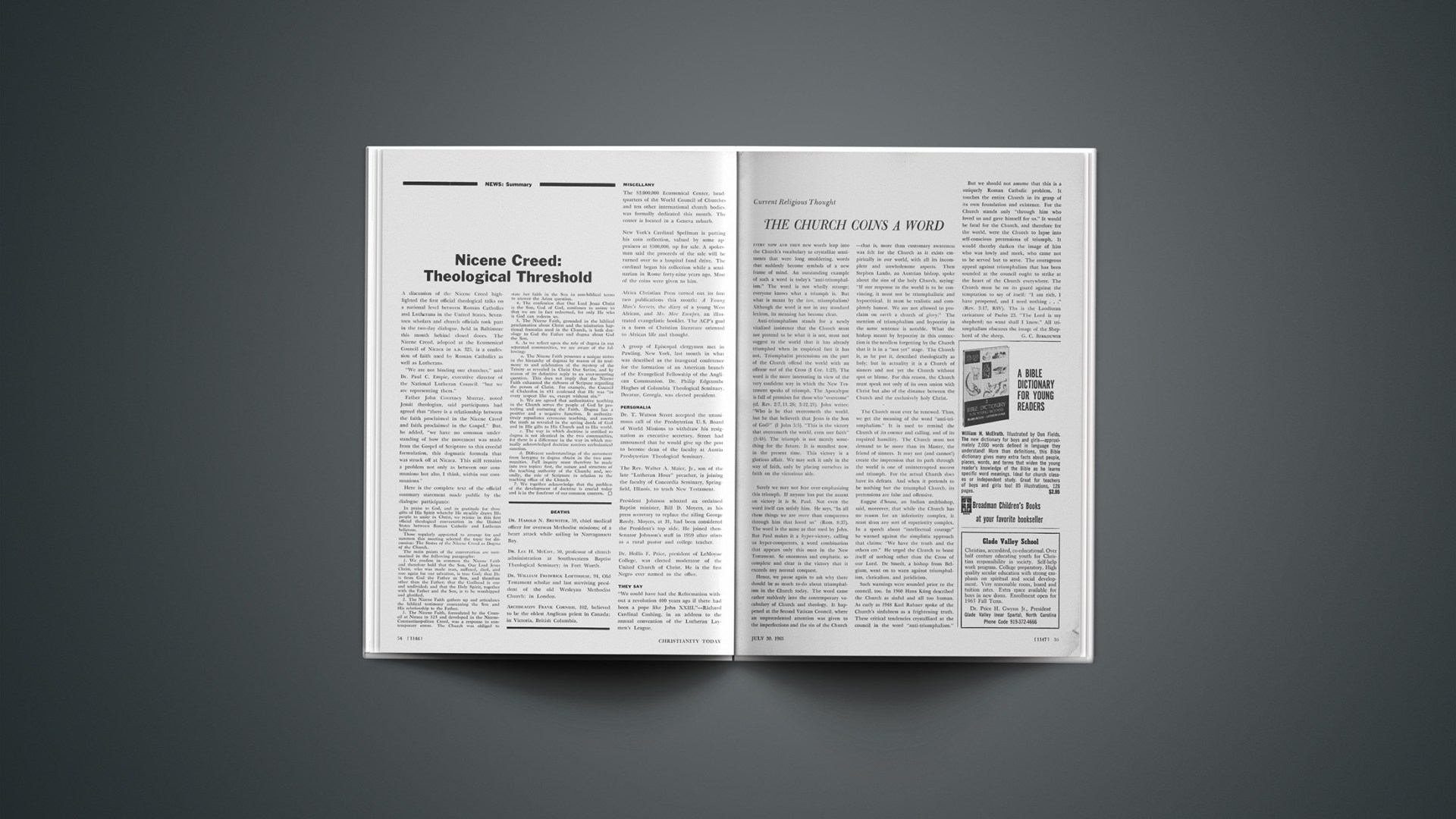THE CHURCH COINS A WORD
Every now and then new words leap into the Church’s vocabulary to crystallize sentiments that were long smoldering, words that suddenly become symbols of a new frame of mind. An outstanding example of such a word is today’s “anti-triumphalism.” The word is not wholly strange; everyone knows what a triumph is. But what is meant by the ism, triumphalism? Although the word is not in any standard lexicon, its meaning has become clear.
Anti-triumphalism stands for a newly vitalized insistence that the Church must not pretend to be what it is not, must not suggest to the world that it has already triumphed when in empirical fact it has not. Triumphalist pretensions on the part of the Church offend the world with an offense not of the Cross (1 Cor. 1:23). The word is the more interesting in view of the very confident way in which the New Testament speaks of triumph. The Apocalypse is full of promises for those who “overcome” (cf. Rev. 2:7, 11, 26; 3:12, 21). John writes: “Who is he that overcometh the world, but he that believeth that Jesus is the Son of God?” (1 John 5:5). “This is the victory that overcometh the world, even our faith” (5:4b). The triumph is not merely something for the future. It is manifest now, in the present time. This victory is a glorious affair. We may seek it only in the way of faith, only by placing ourselves in faith on the victorious side.
Surely we may not fear over-emphasizing this triumph. If anyone has put the accent on victory it is St. Paul. Not even the word itself can satisfy him. He says, “In all these things we are more than conquerors through him that loved us” (Rom. 8:37). The word is the same as that used by John. But Paul makes it a hyper-victory, calling us hyper-conquerors, a word combination that appears only this once in the New Testament. So enormous and emphatic, so complete and clear is the victory that it exceeds any normal conquest.
Hence, we pause again to ask why there should be so much to-do about triumphalism in the Church today. The word came rather suddenly into the contemporary vocabulary of Church and theology. It happened at the Second Vatican Council, where an unprecedented attention was given to the imperfections and the sin of the Church—that is, more than customary awareness was felt for the Church as it exists empirically in our world, with all its incomplete and unwholesome aspects. Then Stephen Laszlo, an Austrian bishop, spoke about the sins of the holy Church, saying: “If our response to the world is to be convincing, it must not be triumphalistic and hypocritical. It must be realistic and completely honest. We are not allowed to proclaim on earth a church of glory.” The mention of triumphalism and hypocrisy in the same sentence is notable. What the bishop meant by hypocrisy in this connection is the needless forgetting by the Church that it is in a “not yet” stage. The Church is, as he put it, described theologically as holy; but in actuality it is a Church of sinners and not yet the Church without spot or blame. For this reason, the Church must speak not only of its own union with Christ but also of the distance between the Church and the exclusively holy Christ.
The Church must ever be renewed. Thus, we get the meaning of the word “anti-triumphalism.” It is used to remind the Church of its essence and calling, and of its required humility. The Church must not demand to be more than its Master, the friend of sinners. It may not (and cannot!) create the impression that its path through the world is one of uninterrupted success and triumph. For the actual Church does have its defeats. And when it pretends to be nothing but the triumphal Church, its pretensions are false and offensive.
Eugene d’Sousa, an Indian archbishop, said, moreover, that while the Church has no reason for an inferiority complex, it must shun any sort of superiority complex. In a speech about “intellectual courage” he warned against the simplistic approach that claims: “We have the truth and the others err.” He urged the Church to boast itself of nothing other than the Cross of our Lord. De Smedt, a bishop from Belgium, went on to warn against triumphalism, clericalism, and juridicism.
Such warnings were sounded prior to the council, too. In 1960 Hans Küng described the Church as sinful and all too human. As early as 1948 Karl Rahner spoke of the Church’s sinfulness as a frightening truth. These critical tendencies crystallized at the council in the word “anti-triumphalism.”
But we should not assume that this is a uniquely Roman Catholic problem. It touches the entire Church in its grasp of its own foundation and existence. For the Church stands only “through him who loved us and gave himself for us.” It would be fatal for the Church, and therefore for the world, were the Church to lapse into self-conscious pretensions of triumph. It would thereby darken the image of him who was lowly and meek, who came not to be served but to serve. The courageous appeal against triumphalism that has been sounded at the council ought to strike at the heart of the Church everywhere. The Church must be on its guard against the temptation to say of itself: “I am rich, I have prospered, and I need nothing …” (Rev. 3:17, RSV). Ths is the Laodicean caricature of Psalm 23. “The Lord is my shepherd; no want shall I know.” All triumphalism obscures the image of the Shepherd of the sheep.










